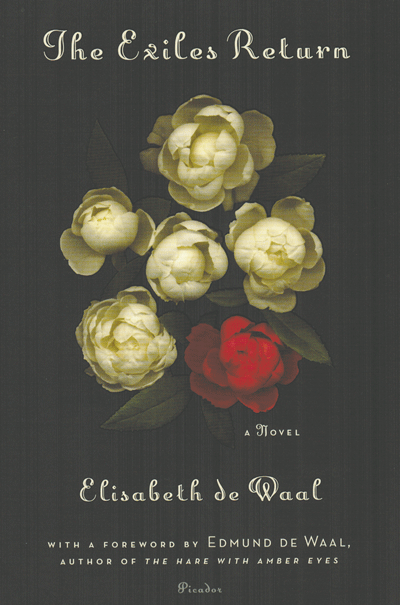The Exiles Return, by Elisabeth de Waal, Picador, 366 pages, $26
Reviewed by NEAL GENDLER
One of the mysteries of Elisabeth de Waal’s charming romantic mystery, The Exiles Return, is why it sat unpublished for nearly six decades.
De Waal, one of the 19th century’s hugely rich, Jewish Ephrussi family — subject of her grandson Edmund de Waal’s captivating The Hare with Amber Eyes — produced a well-crafted, wistful tale set in occupied 1950s Austria.

“This is a novel about being Viennese,” about exile and return, love, anger, despair and “about a place which is part of your identity, but which has also rejected you,” Edmund de Waal writes in a foreword. The novel was amid his grandmother’s papers and published first in London, which accounts for some spellings and idioms, if not for a rather too-liberal sprinkling of untranslated French.
It’s sad that this good book — one of three she wrote in English and two in German — was, like her others, rejected in the author’s lifetime. The Exiles Return is a splendidly spun story. The primary outcome — the gunshot death of a main character — is known from the prelude, but Elisabeth de Waal pulls us there gently through seemingly unrelated stories that merge.
Exiles combines three main stories and characters: the return of Dr. Kuno Adler, a Jewish professor who fled Vienna before the Nazi takeover; Marie-Theres Larsen, a gorgeous, intelligent but vacuous American teen whose Austrian princess mother married a Danish chemist and moved to the United States; and Theophil Kanakis, a rich New York developer born in Austria to a family of political influence and Greek descent.
The professor is the most-developed character. We learn just enough about the other two and the secondary players for their paths to appear to entwine naturally through credible coincidences. War’s consequences appear occasionally, mostly as a backdrop, suggesting how the central family’s titles have become as threadbare as Austrians’ wardrobes.
Adler returns to Austria for reinstatement in his research position, beneath an unpleasant director whose job he’d have held but for his necessary flight. Larsen, who doesn’t know what she wants, is sent for a few months to her Austrian cousins — various non-moneyed royalty. Kanakis rehabilitates a quaint but rotting house into a salon for the young and hip.
De Waal describes Kanakis’ leading guest, an impoverished prince, with this marvelous sentence: “He was a slight young man, rather under medium height, but so perfectly proportioned as to suggest that anyone taller or broader must inevitably be clumsy.”
Her book also is beautifully proportioned, with loves developing unexpectedly, loves unrequited and varied lives in a society rebuilding from the derailments of two world wars. I expected no hint of sympathy for Hitler-welcoming Austria, and I found none.
I won’t give away the plot, which keeps the reader in suspense, waiting for the gunshot. That’s the one certainty amid this tale of surprises, and knowing it will come doesn’t stop you from illogically hoping it won’t.
De Waal seems to write from her own sense of loss. Born into wealth in 1899 Vienna, she earned a doctor of laws degree from the University of Vienna, then was a Rockefeller Foundation fellow at Columbia University. By 1940, the family fortune, which began with grain trading in Russia and expanded to banking, had been destroyed by the Bolshevik revolution, World War I and the Nazis.
She married the Dutch Hendrik de Waal in an Anglican church in Paris. Ultimately, they settled in England, to which she brought her father.
Elisabeth visited her war-damaged, stripped family home in December 1945, when it was used for occupation offices, and reclaimed 246 netsuke — small Japanese carved animals — that a servant had hidden under her mattress as the Gestapo looted most everything else. The netsuke became the catalyst for Hare, published in 2010 with quotations from then-unpublished Exiles.
In his foreword, Edmund de Waal calls his grandmother’s novel “profoundly autobiographical” and, through her Adler character, showing “the heartbreak of returning.”
***
Neal Gendler is a Minneapolis writer and editor.
(American Jewish World, 2.14.14)




















